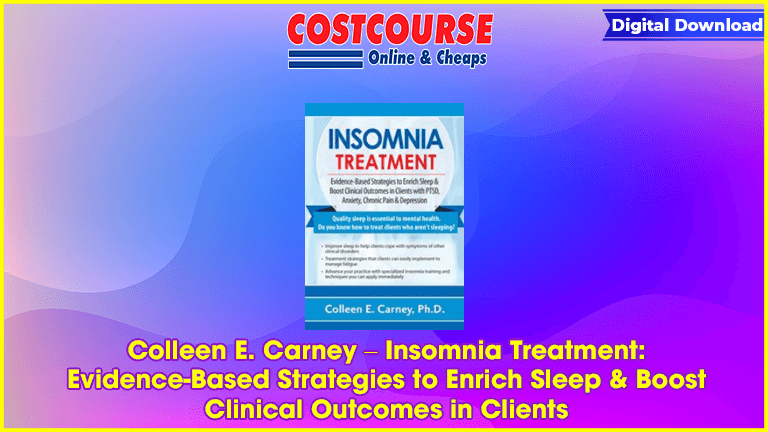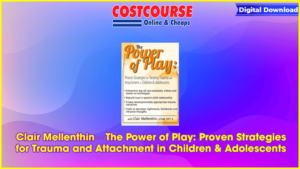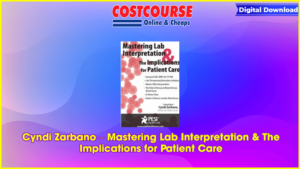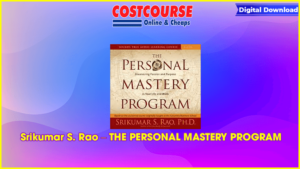Description
We all know the necessity of sleep –yet we often overlook addressing it in therapy. Your clients with PTSD, anxiety, depression and chronic pain are struggling with symptoms of those disorders, and everything is made worse when they aren’t able to sleep.
Colleen E. Carney – Insomnia Treatment: Evidence-Based Strategies to Enrich Sleep & Boost Clinical Outcomes in Clients with PTSD, Anxiety, Chronic Pain & Depression
If your clients aren’t sleeping, do you know what to do about it?
In this recording, I’ll show you successful, proven techniques I’ve developed over the last decade on how to optimize your clients’ sleep – without medication! You don’t need to be a sleep specialist to implement these strategies in your office.
Discover evidence-based strategies to help your clients increase energy during the day, sleep more deeply and re-initiate sleep after it’s been disrupted. In addition, you’ll learn how to easily integrate these strategies into existing treatment for trauma, anxiety, depression and chronic pain.
Watch and discover:
New tools to assess for sleep quality & sleep disorders other than insomnia
Strategies to address conditioned wakefulness and restore your clients’ sleep drives
Sleep logs, worksheets and other tools to use in your clinical practice
Specific interventions for clients with comorbid PTSD, anxiety, depression or chronic pain
Add insomnia treatment to your therapeutic toolbox!
Handouts
Manual – Insomnia Treatment (1.31 MB) 38 Pages Available after Purchase
Outline
Assessment
Sleep regulation
The elements of insomnia
Goals of assessment
Diagnostic criteria
Comorbid conditions
Other sleep disorders
When to make a referral to a sleep clinic
Take-home assessment tools
Limitations of the research & potential risks
Case Study: Sleep phase delay vs. insomnia
Stimulus Control (SC): Address Conditioned Arousal to Reduce Wakefulness
Psychoeducation for your client
Rules for reassociating the bed with sleep
Fatigue management strategies to eliminate napping
Ideas for late-night activities
Case Study: Is the client a candidate for stimulus control?
Sleep Restriction Therapy (SRT): Restore the Sleep Drive to Improve Sleep Quality
How to present rationale to your client
Calculate time-in-bed prescription
Placing the time-in-bed window
Identify & overcome obstacles to adherence
Sleep extension
How to combine SC & SRT effectively
Sleep hygiene
Case Study: Would you increase time in bed?
Counterarousal Strategies: Five MustKnow Strategies to Quiet an Active Mind
Establish a buffer zone
Scheduled thinking time
Combat excessive rumination
Mindfulness strategies
Relaxation therapies
Cognitive Therapy: Identify and Change Distorted Thoughts about Sleep
Thought records
Behavioral experiments
Socratic questioning
Case Study: Interpreting thought records
Modify Insomnia Treatment for Clients with Comorbid Disorders
PTSD
Fear of silence
Fear of loss of vigilance
Delayed bedtime
Sleep avoidance
Prolonged nightmare awakenings
Is hypnotic discontinuation necessary?
Anxiety
When stimulus control rules can’t be tolerated
Combat hastiness to get out of bed
Sleep compression: An alternative to SRT
Identify sleep anxiety vs. high arousal in bed
Considerations for panic disorder
Depression
Sleep’s impact on mood
Distorted time-in-bed to time sleeping ratio
Use of coping cards
Troubleshoot adherence problems
Worsening moods
Case Study: Struggling to get out of bed
Chronic Pain
Pain meds & sleep
Considerations for use of stimulus control
Break the association of bed & pain
When it’s physically difficult to get out of bed
Faculty
Colleen E. Carney, Ph.D.
Colleen E. Carney, Ph.D., is on faculty in the Department of Psychology at Ryerson University, where she is director of the Sleep and Depression Laboratory. She is a leading expert in psychological treatments for insomnia, particularly in the context of co-occurring mental health issues. Her work has been featured in The New York Times and she has over 100 publications on insomnia.
She frequently trains students and mental health providers in CBT for Insomnia at invited workshops throughout North America and at international conferences. Dr. Carney is a passionate advocate for improving the availability of treatment for those with insomnia and other health problems. For more information, please visit www.drcolleencarney.com.
Speaker Disclosure:
Financial: Colleen Carney is a professor at Ryerson University. She receives a speaking honorarium from PESI, Inc.
Non-financial: Colleen Carney is a member of the Canadian Psychological Association; and the Association for Behavioural and Cognitive Therapies (ABCT).








